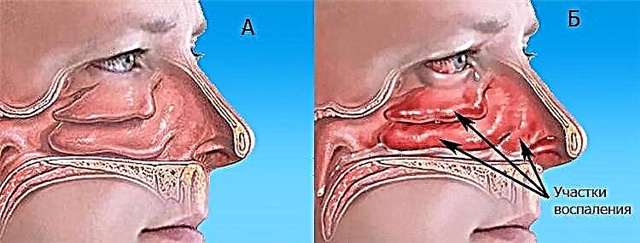The nose is one of the organs in which most of the vessels and capillaries are located. They pass close to the mucous membrane, therefore they can be damaged by the slightest injury or changes in the body. Such an intense blood supply is due to the production of a secretion that protects us from pathogens. To produce mucus, the ciliated epithelium must be supplied with nutrients that are transported through the circulatory system. It also performs a thermoregulatory function - it is responsible for warming the air entering the bronchi and lungs. Anyone can get nosebleed when blowing their nose.
Nose vulnerability
 There are various reasons why nosebleeds occur when you blow your nose. However, the main predisposing factors for all disorders are the same, they are:
There are various reasons why nosebleeds occur when you blow your nose. However, the main predisposing factors for all disorders are the same, they are:
- high permeability of blood vessels and capillaries;
- fragility of blood vessels and capillaries;
- the location of capillaries and vessels near the surface of the mucous membrane.
These aspects make the nasal passage very vulnerable to various injuries and disorders. Most often, bleeding is accompanied by profuse mucous discharge from the nose. This indicates the presence of diseases of the upper respiratory tract.
In any case, only a doctor can correctly diagnose and prescribe an effective treatment. It is forbidden to take any funds on your own, as this can only aggravate the pathology.
Reasons for violation
Blood from the nose when blowing out can appear for various reasons. The main task of the patient is to seek medical help in time in order to begin effective treatment of the disorder. In some cases, local drugs can be dispensed with, but sometimes long-term systemic therapy is required.
Consider why bleeding can disturb a person.
- Getting injured when toilet nose. When a person tries to get rid of the mucus and crusts accumulated in the nose, he begins to blow his nose strongly. This negatively affects intracranial pressure - it rises sharply. If the vessels and capillaries are not strong enough, or if the body is undergoing an inflammatory process, blood may flow. Its amount is insignificant, most often only scanty blotches. The affected vessels and capillaries are quickly restored, epistaxis does not develop, the patient's condition returns to normal.
 Colds. When a person becomes infected with a viral, fungal, or bacterial infection of the upper respiratory tract, the body produces a powerful immune response. Protective cells (platelets, neutrophils, lymphocytes, etc.) are sent to the affected areas of the body, including the nose. They are transported by the circulatory system, due to its overload, severe edema occurs in the mucous membrane, sometimes it is so large that the air supply is partially or even completely blocked. In such cases, overfilled blood vessels and capillaries may not be able to withstand the pressure, and a runny nose appears.
Colds. When a person becomes infected with a viral, fungal, or bacterial infection of the upper respiratory tract, the body produces a powerful immune response. Protective cells (platelets, neutrophils, lymphocytes, etc.) are sent to the affected areas of the body, including the nose. They are transported by the circulatory system, due to its overload, severe edema occurs in the mucous membrane, sometimes it is so large that the air supply is partially or even completely blocked. In such cases, overfilled blood vessels and capillaries may not be able to withstand the pressure, and a runny nose appears.- Inflammation of the paranasal sinuses. The paranasal sinuses are also prone to inflammation, in which purulent mucus can be discharged. Acute sinusitis and chronic sinusitis in the form of an exacerbation often lead to the fact that the nose bleeds when blowing the nose. Often, the infection is of a mixed type, it is dangerous for the patient because it can enter the bloodstream and cause sepsis. When the first symptoms of the disease are found, it is worth going to the doctor to make the correct diagnosis and choose therapy.
- Reduced elasticity of blood vessels and capillaries. Lack of vitamins P (rutin) and C (ascorbic acid) can lead to fragility and fragility of the walls of blood vessels. This increases their permeability, blood can simply seep into the nasal passage, where it mixes with mucus. Also, the reason for the insufficient strength of the blood capillaries can be a hereditary disease - hemophilia, it is transmitted only from mothers to male children and from fathers to daughters. Avitaminosis can also be caused by factors such as overwork, unhealthy diet, abuse of alcoholic beverages and drugs, tobacco smoking. Regular cardio training and a healthy lifestyle can help strengthen your entire cardiovascular system.
- Hormonal Disorders. This cause leads to the appearance of bloody discharge during blowing the nose in women. Teenage girls and pregnant women are prone to complete hormonal changes. A spike in steroids can cause a disorder, most often it occurs if the nasal mucosa is exhausted.
 Drug abuse. Blood thinning medications are often disruptive if used uncontrollably. Most often, the elderly face this problem; it can be eliminated by abolishing blood-thinning drugs. Also, the cause of bleeding when blowing your nose can be an overdose of vasoconstrictor sprays and drops, which are prescribed for rhinitis. Such drugs can be taken for no more than 1 week, otherwise they dry out the nasal mucosa, make the vessels and capillaries thin and fragile, which leads to bleeding.
Drug abuse. Blood thinning medications are often disruptive if used uncontrollably. Most often, the elderly face this problem; it can be eliminated by abolishing blood-thinning drugs. Also, the cause of bleeding when blowing your nose can be an overdose of vasoconstrictor sprays and drops, which are prescribed for rhinitis. Such drugs can be taken for no more than 1 week, otherwise they dry out the nasal mucosa, make the vessels and capillaries thin and fragile, which leads to bleeding.- Anatomical features. A deviated nasal septum or too close an arrangement of blood vessels to the mucosal surface can cause bleeding when blown out. You can get rid of the problem with the help of an operation, if we are talking about a curved septum. If the matter is in the vessels, then they can be cauterized in just a few minutes under local anesthesia.
- The presence of neoplasms. Malignant and benign neoplasms in the nasal cavity directly affect the blood supply. If the tumors are not oncogenic, then they can be treated with medication or surgery, if cancer cells are found, then long-term complex therapy is required.
- Unfavorable working and living conditions. Too dusty, dry and hot air depletes the nasal mucosa. Vessels and capillaries become brittle, with strong exhalation of air, they burst, which leads to the appearance of blood discharge. The situation can be corrected by humidifying the air at home, for this you need to purchase a special household humidifier. When work causes irritation, then you need to do it only in a respirator or other protective equipment.
The danger of delayed treatment
 If the patient does not go to the doctor in time, then the diseases that caused the bleeding may progress. In some cases, this is almost asymptomatic until a certain point, and sometimes it causes a serious deterioration in well-being. An immediate examination is necessary if the following symptoms are added to the bleeding:
If the patient does not go to the doctor in time, then the diseases that caused the bleeding may progress. In some cases, this is almost asymptomatic until a certain point, and sometimes it causes a serious deterioration in well-being. An immediate examination is necessary if the following symptoms are added to the bleeding:
- headache (local or general);
- increased body temperature;
- chills, weakness, malaise;
- skin rash;
- ear pain;
- vision problems (double vision, the clarity of picture perception deteriorates);
- decreased physical and mental activity.
In conclusion
The admixture of blood in the discharge from the nose when blowing your nose in most cases does not signal any serious violations, it can be a side effect of a cold.
However, violations can signal the presence of more serious pathologies that require immediate treatment. Only an otolaryngologist can make a correct diagnosis after instrumental, hardware and laboratory examination. Do not ignore the problem to prevent complications from developing.

 Colds. When a person becomes infected with a viral, fungal, or bacterial infection of the upper respiratory tract, the body produces a powerful immune response. Protective cells (platelets, neutrophils, lymphocytes, etc.) are sent to the affected areas of the body, including the nose. They are transported by the circulatory system, due to its overload, severe edema occurs in the mucous membrane, sometimes it is so large that the air supply is partially or even completely blocked. In such cases, overfilled blood vessels and capillaries may not be able to withstand the pressure, and a runny nose appears.
Colds. When a person becomes infected with a viral, fungal, or bacterial infection of the upper respiratory tract, the body produces a powerful immune response. Protective cells (platelets, neutrophils, lymphocytes, etc.) are sent to the affected areas of the body, including the nose. They are transported by the circulatory system, due to its overload, severe edema occurs in the mucous membrane, sometimes it is so large that the air supply is partially or even completely blocked. In such cases, overfilled blood vessels and capillaries may not be able to withstand the pressure, and a runny nose appears. Drug abuse. Blood thinning medications are often disruptive if used uncontrollably. Most often, the elderly face this problem; it can be eliminated by abolishing blood-thinning drugs. Also, the cause of bleeding when blowing your nose can be an overdose of vasoconstrictor sprays and drops, which are prescribed for rhinitis. Such drugs can be taken for no more than 1 week, otherwise they dry out the nasal mucosa, make the vessels and capillaries thin and fragile, which leads to bleeding.
Drug abuse. Blood thinning medications are often disruptive if used uncontrollably. Most often, the elderly face this problem; it can be eliminated by abolishing blood-thinning drugs. Also, the cause of bleeding when blowing your nose can be an overdose of vasoconstrictor sprays and drops, which are prescribed for rhinitis. Such drugs can be taken for no more than 1 week, otherwise they dry out the nasal mucosa, make the vessels and capillaries thin and fragile, which leads to bleeding.

